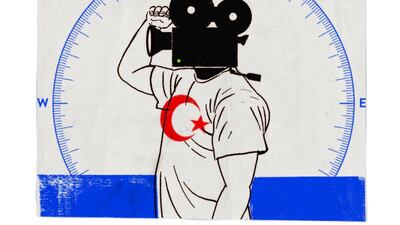Seeing the wide-variety of first-rate films being screened at the Abu Dhabi Film Festival warms my heart. We have come a long way and although there’s still a long way to go, we are getting there.
Vibrant film offerings are providing audiences with a better understanding of the Arab world and are also helping to shatter Hollywood's stereotypical Arab images.
In the US, Arab film festivals are more popular than ever before. Inaugurated in January 1996, Washington DC’s Arabian Sights Festival and San Francisco’s Arab Film Festival are the longest running events of this type. Taken together, they screen films emerging out of the Arab world to thousands of viewers in the US, as well as films directed by Arab Americans.
What the Arab and Arab American festivals have in common is this: the films they show shatter myths, whether by seeing a teenage girl riding a bike in Saudi Arabia, or an Arab American couple courting one another in Dearborn, or watching the impact of the occupation on Palestinians. Arabs and Arab Americans and others are at long last defining themselves rather than having others define them.
They offer more realistic, humane Arab portraits and eradicate stereotypes. And, there are more and more films being directed by young image-makers than ever before. Arab filmmakers have created fresh films dealing with topical issues, which have been screened around the world.
For example, several recent films view Palestine and how the Israeli occupation impacts Palestinians, young and old. Films such as Imad Burnat’s Five Broken Cameras (2011), Susan Youssef’s Habibi (2012) and Hani Abu Assad’s Omar (2013). To their credit, some Israeli filmmakers have also exposed the occupation’s telling effects on Palestinians: films such as Yuval Adler’s Bethlehem (2013). The Israeli Film Council provided funding for Suha Arraf’s Villa Touma (2014), a film that takes place after the 1967 war, and focuses on three Christian women living in their once elegant home in Ramallah.
In the early 1960s, when I was working in West Berlin, I watched East Germans construct the Berlin Wall.
Since then, the wall has surfaced in many films, most notably The Spy Who Came in From the Cold (1965). And yet, to date, no feature film has focused on Israel’s separation wall.
Given the success of up-and-coming Arab and Arab American filmmakers, I ask festival organisers around the world to encourage and support image-makers who want to produce a major feature film exploring how this barrier blocks the road to meaningful peace.
Other stories continue to tumble from the region. Palestinian-American Ziad Foty is working on a documentary, Return to Ramallah: A Palestinian-American Story. The film follows his father, Fuad, on his return to Ramallah after 40 years of life in America.
Abe Kasbo’s soon-to-be- released documentary, A Thousand and One Journeys: The Arab Americans, tells the story of 200 years of the Arab American experience. It is told through the eyes of prominent figures such as Senator George Mitchell, Jamie Farr, Ralph Nader, Anthony Shadid, General John Abizaid and more.
I have been friends with Axis of Evil comedians Maz Jobrani, Dean Obeidallah and Ahmed Ahmed since we first met at a Washington DC conference in 2006. Back then, they were young men struggling to make a name for themselves. Directors and agents warned them that unless they changed their names they would be relegated to playing three types of roles: terrorists, sleazy princes and greedy oil sheikhs. But all three men refused. They would never change their names, they said, no matter what.
All three comedians have had thriving careers at stand-up venues around the world. And all three have made impressive independent features and documentary films. The first was Ahmed’s thoughtful and entertaining documentary, Just Like Us (2011). The film shows him and his fellow stand-up comedians being well received by audiences from New York to Dubai.
Iranian-American Jobrani produced Shirin in Love (2013), a romantic comedy about the relationship between the Iranian protagonist, Shirin, and her non-Iranian mate.
That same year, Dean Obeidallah, along with Negin Farsad, produced, directed and starred in the documentary, The Muslims Are Coming (2013). Familiar names like Jon Stewart and Rachel Maddow appear, offering insightful commentary that exposes and contests discrimination.
Shaheen scholarship recipients, Annemarie Jacir and Jackie Salloum, have directed outstanding films that offer viewers much needed insights about Palestinians in exile.
In Salloum’s second award-winning documentary, Slingshot Hip Hop (2008), she traces rap from its origins to the present.
Critics also applauded Jacir’s second feature-length film, When I Saw You (2012). Here, Jacir depicts the plight of a people through the actions of an 11-year-old boy, Tarek, who acts decisively in order to return to Palestine and find his missing father.
Not so long ago these up-and-coming young filmmakers and many others were struggling artists, just beginning their careers. Some were only thinking about making films, others had just written rough drafts.
Despite all the obstacles they faced, Arab American and Arab image-makers went on to direct and produce inventive independent films that challenge racial, gender and religious stereotypes – films that make us laugh and think at the same time.
The Abu Dhabi Film Festival and the raft of other similar events focusing on this region’s films are providing much needed opportunities to dispel stereotypical images of their own culture before audiences, worldwide, enabling them to offer insights drawn directly from their heritage, and to bridge gaps in understanding between the West and the Arab world.
Jack G Shaheen is the author of Reel Bad Arabs: How Hollywood Vilifies a People and Guilty: Hollywood’s Verdict on Arabs After 9/11

